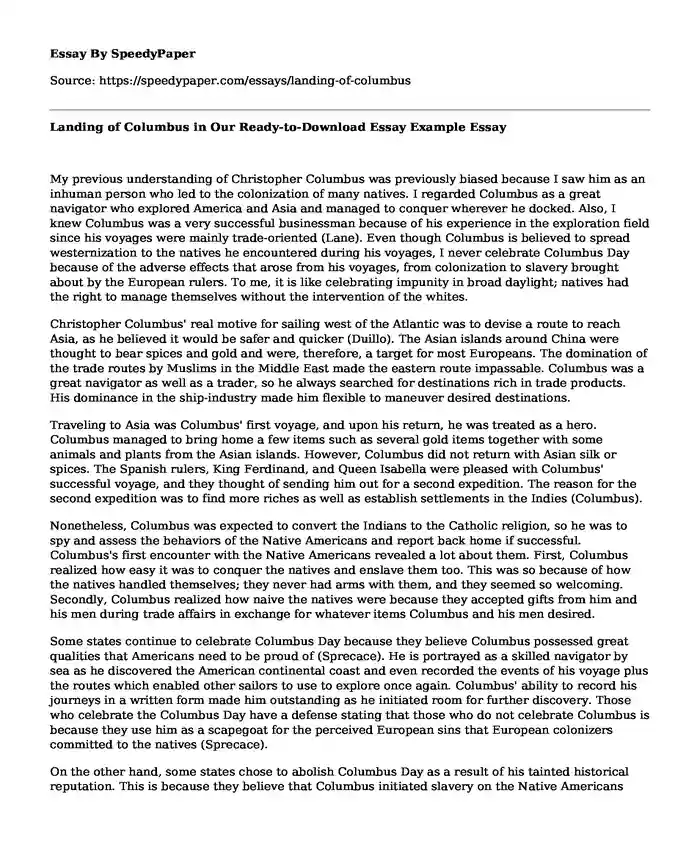
| Type of paper: | Essay |
| Categories: | Christopher Columbus |
| Pages: | 3 |
| Wordcount: | 776 words |
My previous understanding of Christopher Columbus was previously biased because I saw him as an inhuman person who led to the colonization of many natives. I regarded Columbus as a great navigator who explored America and Asia and managed to conquer wherever he docked. Also, I knew Columbus was a very successful businessman because of his experience in the exploration field since his voyages were mainly trade-oriented (Lane). Even though Columbus is believed to spread westernization to the natives he encountered during his voyages, I never celebrate Columbus Day because of the adverse effects that arose from his voyages, from colonization to slavery brought about by the European rulers. To me, it is like celebrating impunity in broad daylight; natives had the right to manage themselves without the intervention of the whites.
Christopher Columbus' real motive for sailing west of the Atlantic was to devise a route to reach Asia, as he believed it would be safer and quicker (Duillo). The Asian islands around China were thought to bear spices and gold and were, therefore, a target for most Europeans. The domination of the trade routes by Muslims in the Middle East made the eastern route impassable. Columbus was a great navigator as well as a trader, so he always searched for destinations rich in trade products. His dominance in the ship-industry made him flexible to maneuver desired destinations.
Traveling to Asia was Columbus' first voyage, and upon his return, he was treated as a hero. Columbus managed to bring home a few items such as several gold items together with some animals and plants from the Asian islands. However, Columbus did not return with Asian silk or spices. The Spanish rulers, King Ferdinand, and Queen Isabella were pleased with Columbus' successful voyage, and they thought of sending him out for a second expedition. The reason for the second expedition was to find more riches as well as establish settlements in the Indies (Columbus).
Nonetheless, Columbus was expected to convert the Indians to the Catholic religion, so he was to spy and assess the behaviors of the Native Americans and report back home if successful. Columbus's first encounter with the Native Americans revealed a lot about them. First, Columbus realized how easy it was to conquer the natives and enslave them too. This was so because of how the natives handled themselves; they never had arms with them, and they seemed so welcoming. Secondly, Columbus realized how naive the natives were because they accepted gifts from him and his men during trade affairs in exchange for whatever items Columbus and his men desired.
Some states continue to celebrate Columbus Day because they believe Columbus possessed great qualities that Americans need to be proud of (Sprecace). He is portrayed as a skilled navigator by sea as he discovered the American continental coast and even recorded the events of his voyage plus the routes which enabled other sailors to use to explore once again. Columbus' ability to record his journeys in a written form made him outstanding as he initiated room for further discovery. Those who celebrate the Columbus Day have a defense stating that those who do not celebrate Columbus is because they use him as a scapegoat for the perceived European sins that European colonizers committed to the natives (Sprecace).
On the other hand, some states chose to abolish Columbus Day as a result of his tainted historical reputation. This is because they believe that Columbus initiated slavery on the Native Americans upon his first landing in the West Indies. Citizens of these states also find that Columbus started a brutal genocide and maltreated the non-white people. As a result, Columbus Day has been replaced with Indigenous Peoples' Day.
Abolishing the Columbus Day would, in a way, help Native Americans address their issues in the communities. By adopting the Indigenous Peoples' Day, it will help in the cultural development of the native tribes hence enabling the people to move forward as well as formulate positive outcomes emanating from the history of colonization. Getting rid of the Columbus Day would mark the start of a new era for the natives as it would mean that people no longer commemorate the effects brought about by Columbus' exploration to the outside lands but are after reconciliation for the better (Board).
Works Cited
Board, The Times Editorial. "Can a holiday to honor Native Americans help heal a history of oppression?" Los Angeles Times (2016).
Columbus, Christopher. "Journal of Christopher Columbus." (1492).
Duillo, John. Christopher Columbus and the Discovery of America. Smithsonian American Art Museum.
Lane, Kris. "Five myths about Christopher Columbus." Chicago Tribune (2015).
Sprecace, David. "Columbus should be celebrated." THE DENVER POST (2007).
Cite this page
Landing of Columbus in Our Ready-to-Download Essay Example. (2022, Feb 23). Retrieved from https://speedypaper.com/essays/landing-of-columbus
Request Removal
If you are the original author of this essay and no longer wish to have it published on the SpeedyPaper website, please click below to request its removal:
- Free Essay on LiL Guy Foods: Merger as a Recipe for Success
- Free Essay on Cultural Competence in Nursing
- Initial Artifact Analysis - Free Essay from Our Database
- Free Essay: Public Policy and Public Engagement on Social Development in Saudi Arabia
- Film-Making Analysis Essay Example
- Free Paper on Choosing the Methodology
- Free Essay Sample on Drugs Use in Sports
Popular categories




